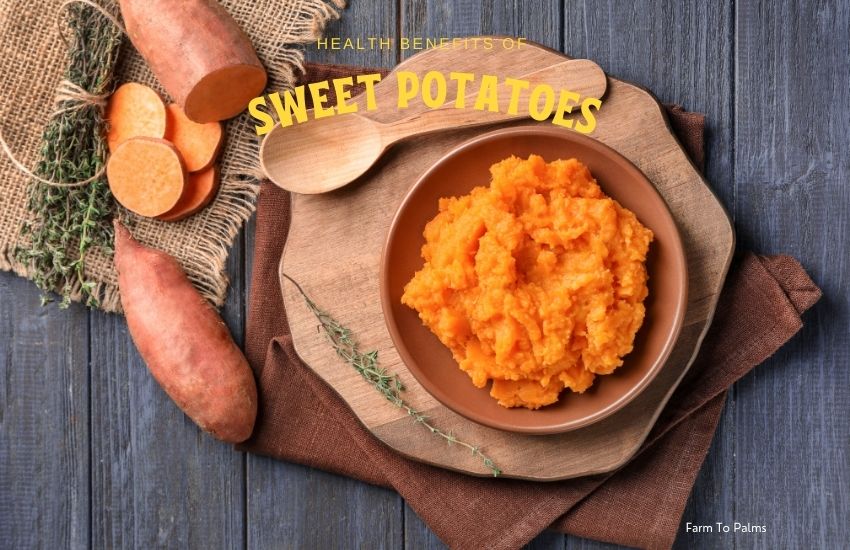Farm To Palms delivers helpful and insightful health information to our readers. One of the most versatile and nutritious foods out there? Sweet potatoes. These root vegetables taste great and are packed with nutrients that can benefit your health in several ways. In this guide, I’ll dive into the health benefits of sweet potatoes, their nutritional profile, and how they compare to other root vegetables like regular potatoes. Plus, I’ll share tips on how you can enjoy them without losing their nutritional punch. Let’s explore what makes sweet potatoes a powerhouse food.
Nutritional Profile of Sweet Potatoes:

Sweet potatoes are more than just a side dish; they’re loaded with nutrients your body craves. These vibrant vegetables are rich in beta-carotene, a powerful antioxidant that converts to vitamin A in your body. Vitamin A is essential for maintaining healthy vision and supporting your immune system.
In addition, sweet potatoes provide a good amount of fiber, especially when eaten with the skin. Fiber helps digestion, keeps you full, and supports healthy gut bacteria. They’re also packed with vitamin C, which is key in repairing body tissues and boosting immune defenses. Sweet potatoes also contain potassium, which helps balance fluids in your body, and manganese, a mineral vital for bone health.
Here’s a quick breakdown of the critical nutrients found in sweet potatoes:
| Nutrient | Amount per ½ cup (boiled) |
|---|---|
| Calories | 125 |
| Fiber | 4 grams |
| Vitamin A | Over 400% daily value |
| Vitamin C | 30% daily value |
| Potassium | 15% daily value |
Key Health Benefits of Sweet Potatoes:
Let’s get into what matters—how these nutrients translate into tangible health benefits. Sweet potatoes can be a game-changer for various aspects of your health. Here’s why:
Eye Health:
Beta-carotene is a standout nutrient in sweet potatoes, especially the orange variety. This compound is converted to vitamin A, which is crucial for eye health. If you’re concerned about night blindness or age-related macular degeneration, adding sweet potatoes to your diet could be beneficial.
Immune System Support:
Sweet potatoes don’t just stop at eye health—they also seriously boost your immune system. Combining vitamin A and vitamin C provides antioxidant protection, helping your body fight off infections more effectively.
Gut Health:

Are you feeling sluggish or irregular? The fiber in sweet potatoes can help. Not only does it promote digestion, but it also supports your gut’s good bacteria. By eating sweet potatoes with the skin, you get soluble and insoluble fiber, which work together to keep your bowels healthy and regular. If you struggle with digestive health, this is one vegetable you’ll want to add to your diet.
Inflammation Reduction:
Purple sweet potatoes, in particular, contain a high dose of anthocyanins, powerful antioxidants that help reduce inflammation in the body. Whether you’re dealing with chronic inflammation or want to prevent it, these colorful tubers can support your overall wellness.
Blood Sugar Management:
Despite being naturally sweet, sweet potatoes can help regulate blood sugar levels. Their moderate glycemic index means they don’t cause sharp spikes in blood sugar like other starchy foods. This makes them an excellent option for people with diabetes or anyone looking to keep their blood sugar stable. If you manage blood sugar levels, consider boiling or steaming your sweet potatoes to lower their glycemic impact.
Sweet Potatoes and Blood Sugar Regulation:
Let’s discuss how sweet potatoes interact with blood sugar. Although they contain natural sugars, their fiber helps slow down glucose absorption, keeping blood sugar levels steady. This is especially helpful for those managing diabetes or prediabetes.
The way you prepare sweet potatoes matters, too. Boiling or steaming them can significantly reduce their glycemic load, meaning they won’t cause sudden sugar spikes in your bloodstream. So, if you’re concerned about blood sugar management, these preparation methods are your best bet.
Comparing Sweet Potatoes to Other Root Vegetables:
How do sweet potatoes compare to regular potatoes, carrots, or yams? Sweet potatoes come out ahead in many ways. While white potatoes may have a higher glycemic index, sweet potatoes have the upper hand regarding beta-carotene and fiber content.
On the other hand, Yams are often confused with sweet potatoes, but they’re pretty different. Yams are starchier and not as nutrient-dense as sweet potatoes. Sweet potatoes are a better choice when you’re looking for a vegetable that supports everything from eye health to gut health.
Best Ways to Prepare Sweet Potatoes for Maximum Health Benefits:

Maximizing the health benefits of sweet potatoes comes down to how you cook them. Steaming or boiling is ideal to preserve their nutrients. These methods retain the most beta-carotene and fiber and lower the vegetable’s glycemic load, making them more suitable for blood sugar regulation.
However, if you prefer roasting or baking, go for it—but be mindful of added ingredients like oils, butter, or sugar, which can turn this healthy food into a calorie-dense dish. Try seasoning roasted sweet potatoes with a sprinkle of cinnamon or paprika to keep it simple.
How Often Should You Eat Sweet Potatoes?
As much as we love sweet potatoes, moderation is key. Since they’re packed with vitamin A, eating too many could lead to an excess of this nutrient, which might not be ideal for everyone. Aim for 2 to 3 servings weekly to reap the health benefits without overdoing it. A serving size can be as simple as half a cup of boiled sweet potatoes, making them easy to integrate into your diet. And if you’re diabetic or managing blood sugar, it’s even more important to monitor your intake.
Common Misconceptions About Sweet Potatoes:
Now, let’s clear up some myths. For starters, sweet potatoes are not the same as yams—they’re different vegetables entirely. Another common misconception is that sweet potatoes cause weight gain. In reality, they’re relatively low in calories, and thanks to their fiber content, they help you feel fuller for longer.
Contrary to popular belief, sweet potatoes are also an excellent option for people with diabetes, as long as they’re eaten in moderation and appropriately prepared. Finally, some people think that sweet potatoes lose their nutrients during cooking, but that’s not the case when you use gentle methods like steaming or boiling.
Conclusion:
Incorporating sweet potatoes into your diet is a tasty and effective way to support your overall health. Their benefits are hard to ignore, from boosting your immune system to improving digestion. I encourage you to try some of these preparation methods and see the difference. For more tips and health advice, feel free to explore more on farmtopalms.com!
If you’ve enjoyed this article, comment, share it with your friends, or check out our other health-related topics on Farm To Palms.

